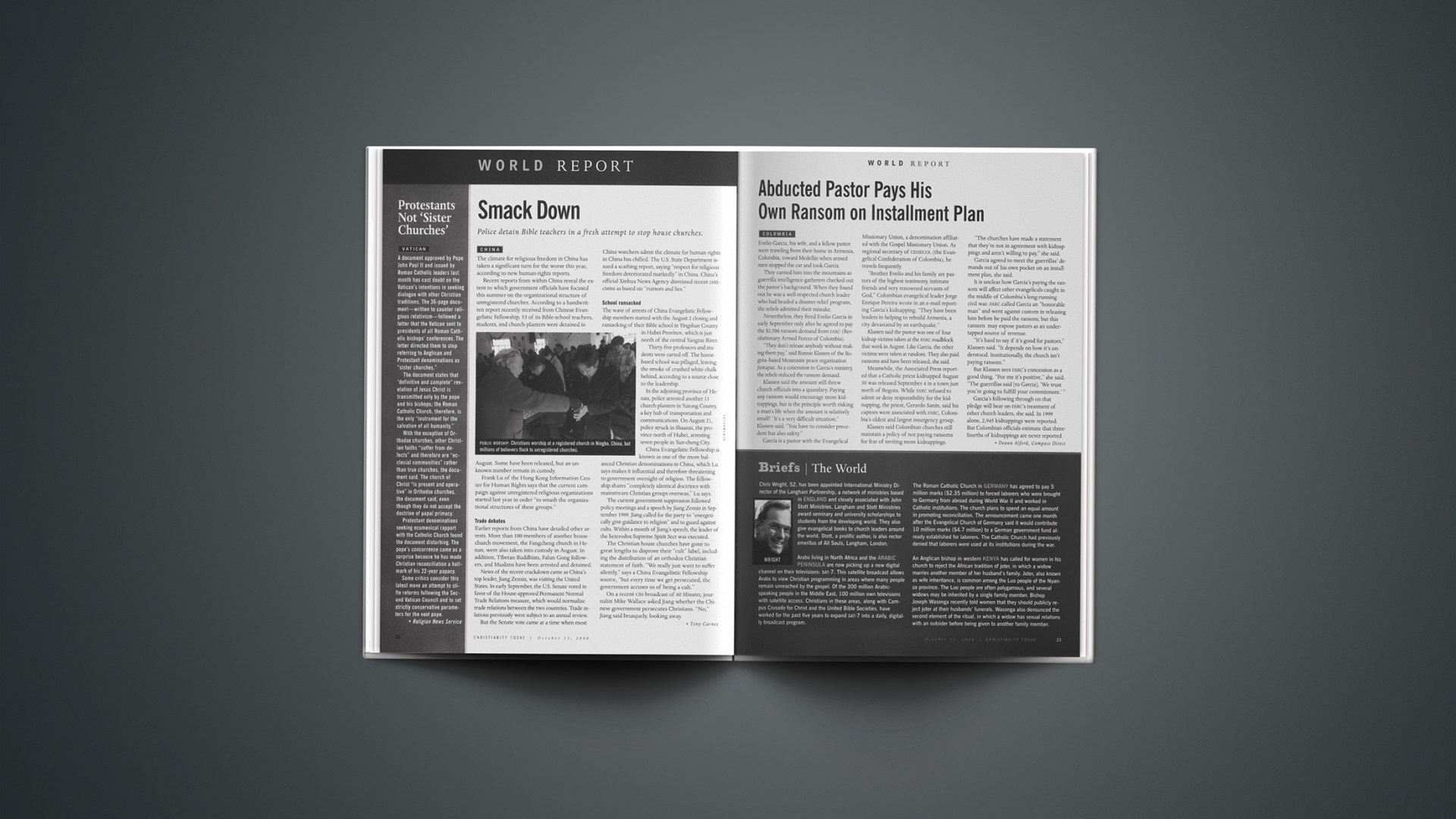After FARC intelligence reported to its leaders that the man its forces had snatched August 27 at a roadblock near Medellin was a well-respected church leader who had headed a disaster relief program, the guerrilla group acknowledged it made a mistake in detaining him.Nevertheless, freedom came for Evelio García late on September 2 only after he agreed to pay the $2,500 ransom demand from FARC (Revolutionary Armed Forces of Colombia).”They don’t release anybody without making them pay,” said Bonnie Klassen of the Bogota-based Mennonite peace organization Justapaz. As a concession to Garcia’s ministry, “They reduced (the ransom) to the minimum amount.”Indeed, the ransom demanded for García was so much lower than typical ransoms, church officials wondered whether common delinquents were behind the kidnapping. Regardless, Klassen said the amount still threw church officials into a quandary: Paying any ransom would encourage more kidnappings, but is the principle worth risking a man’s life when the amount in question is so relatively small?”It’s a very difficult situation,” Klassen said. “You have to consider precedent, but also safety.”García, his wife and a fellow pastor were traveling in a vehicle from their home in Armenia toward Medellin when armed men stopped the car and took García. They carried him into the mountains as guerrilla intelligence-gatherers checked out the pastor’s background using computers and other means. The incident took place in La Pintada, one and one-half hours south of Medellin in northwest Colombia.García is a pastor with the Evangelical Missionary Union, a denomination affiliated with the Gospel Missionary Union. As regional secretary of CEDECOL, the Evangelical Confederation of Colombia, he travels to churches in Quindió, Risaralda and Caldas provinces. Klassen said that Justapaz has worked with Garcia to carry out ministry projects and described him as a well-known leader who had done a lot of good in his home city.In his e-mail reporting García’s kidnapping, evangelical leader Jorge Enrique Pereira wrote, “Brother Evelio and his family are pastors of the highest testimony, intimate friends and very renowned servants of God. They have been leaders in helping to rebuild Armenia, a city devastated by an earthquake.” García and his church have been partnering with other groups to reconstruct the coffee-growing sector of Colombia, Pereira wrote.Klassen said that the pastor was one of four kidnap victims taken at the FARC roadblock at La Pintada last week. Like García, the other victims were taken at random. They also paid ransoms and have been released, she said.Meanwhile, the Associated Press reported that a Catholic priest kidnapped August 30 was released on September 4 in a town just north of Bogota. While FARC refused to admit or deny responsibility for the kidnapping, the priest, Gerardo Sanin, said that his captors were FARC rebels. FARC is Colombia’s oldest and largest insurgency group.Klassen said that Colombian churches still maintain the policy of not paying ransom so as not to invite more kidnappings.”The churches have made a statement that they’re not in agreement with kidnappings and aren’t willing to pay,” she said. “But any one person can do anything on a personal level.” García agreed to meet the guerrilla demands out of his own pocket on an installment plan, she said.While the guerrillas admitted that García had done good things in his community, it is not known how his paying the ransom will affect other evangelicals caught in the middle of Colombia’s long-running civil war.”It’s hard to say if it’s good for pastors,” she said. “It depends on how it’s understood. Institutionally, the church isn’t paying ransom.”But Klassen looks at it as a good thing. “For me it’s positive,” she said. “The guerrillas said (to García), ‘We trust you’re going to fulfill your commitment’.” García’s following through on that pledge will bear on FARC’s treatment of other church leaders, she said.Evangelicals who worked for García’s release were amazed at the vast network of knowledge the guerrillas had on him.”He realized first thing that they knew everything about him,” Klassen said, adding that their knowledge included his bank accounts, family and work. “Dealing with any of the powerful, armed groups isn’t a joke.”A CEDECOL staff member told Compass that while no road is safe to travel in Colombia, La Pintada doesn’t have an especially dangerous reputation. Nor is the area known for a particular rebel or paramilitary group’s activity. At first, CEDECOL believed that the leftist guerrilla National Liberation Army, or ELN, had kidnapped the pastor.Copyright © 2000 Compass Direct
Related Elsewhere
Visit the Library of Congress’s Country Study on Colombia.Click here for the Colombian Embassy in the United States.Click and scroll to read about Justapaz, the Mennonite Church’s peace effort in Colombia.The Colombia Support Network is a group that lobbies for human rights initiatives in Colombia.Our earlier coverage of the church in Colombia includes:Plan for Peace in Colombia Is a Plan ‘For Death,’ Say Church Activists | Will U.S. military assistance in destroying coca fields only increase violence? (Aug. 15, 2000) Death in the Night | Colombia’s pastors endure extortion, kidnappings, and threats as they plant churches and help the poor in a war zone. (June 6, 2000) Colombia’s Bleeding Church | Despite the murders of 120 church leaders, Christians are fighting for peace in one of the world’s most violent nations. (May 18, 1998) Fate of Kidnapped Missionaries Still Unresolved | Colombia remains thought to end questions are not human after all. (Mar. 29, 2000) Twenty-five Pastors Killed This Year (Oct. 4, 1999) Christians Held As Hostages (July 12, 1999)Other media coverage of Columbia includes:Colombia Rebel Decries Plan | Associated Press (Sept. 7, 2000) Conflict Drives Thousands From Their Homes in Colombia | The Washington Post (Sept. 6, 2000) Colombia’s FARC likely to pressure government until ceasefire talks | Associated Press (Sept. 6, 2000) Rebel attack in Colombia | BBC (Sept. 3, 2000)
Copyright © 2000 Christianity Today. Click for reprint information.







